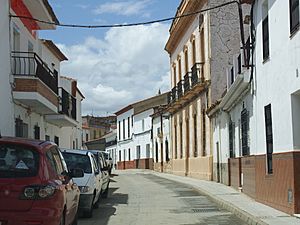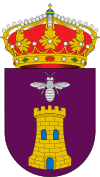Paymogo facts for kids
Quick facts for kids
Paymogo
|
|||
|---|---|---|---|

Paymogo street view
|
|||
|
|||
| Country | Spain | ||
| Autonomous community | Andalusia | ||
| Province | Huelva | ||
| Comarca | Andévalo | ||
| Area | |||
| • Total | 214 km2 (83 sq mi) | ||
| Elevation | 177 m (581 ft) | ||
| Population
(2018)
|
|||
| • Total | 1,167 | ||
| • Density | 5.453/km2 (14.12/sq mi) | ||
| Demonym(s) | Paymogueros | ||
| Time zone | UTC+1 (CET) | ||
| • Summer (DST) | UTC+2 (CEST) | ||
| Postal code |
21560
|
||
Paymogo is a small town and municipality in Spain. It is located in the Andévalo area, which is part of the Huelva province. This province is in the Andalusia region of southern Spain.
Paymogo is special because it shares a border with Portugal on its western side. In 2014, about 1,218 people lived in Paymogo.
Contents
Where is Paymogo Located?
Paymogo is found in the western part of the Andalusia region. This area is known for its beautiful natural landscapes. The town is part of the Huelva province.
Bordering Portugal
One interesting fact about Paymogo is its close connection to Portugal. The border between Spain and Portugal runs right next to the municipality. This means that people in Paymogo can easily visit their neighbors in Portugal.
What is a Municipality?
A municipality is like a local government area. It includes a main town or city and the surrounding countryside. Paymogo is a municipality, which means it has its own local government. This government helps manage services for the people living there.
How Paymogo is Governed
The local government in Paymogo is led by a Mayor. The mayor and other elected officials make decisions for the town. They work to improve life for the residents. This includes things like managing public spaces and local services.
Population and People
In 2014, the population of Paymogo was 1,218 people. The people who live in Paymogo are called Paymogueros. The town is a quiet place with a friendly community.
Life in Paymogo
Life in Paymogo is typical of a small Spanish town. It has a relaxed pace. The community often comes together for local events and traditions. Many people work in farming or other local businesses.
See also
 In Spanish: Paymogo para niños
In Spanish: Paymogo para niños
 | James Van Der Zee |
 | Alma Thomas |
 | Ellis Wilson |
 | Margaret Taylor-Burroughs |




